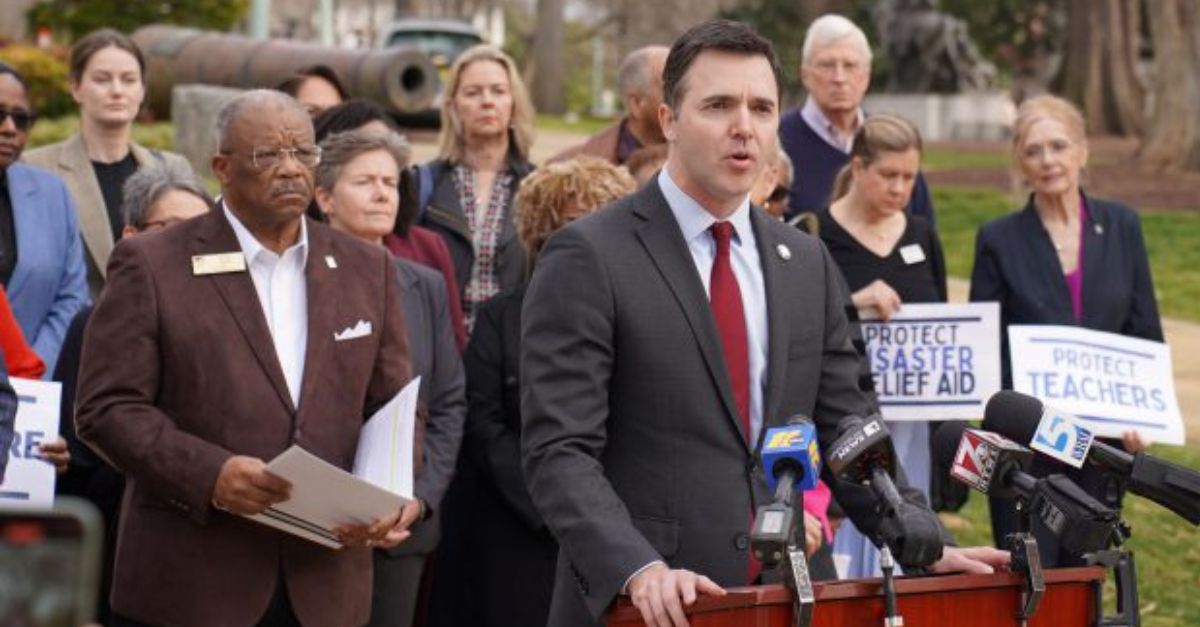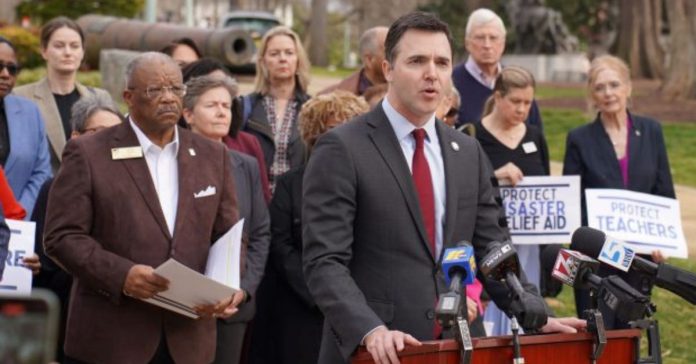
North Carolina Attorney General Jeff Jackson speaks at a press conference (NCDOJ).
A federal judge has sanctioned North Carolina”s Department of Justice (NCDOJ), finding that a branch of the state agency has been “disregarding court orders” in a “deeply troubling” manner.
U.S. Magistrate Judge Robert Numbers’ 43-page order issued on Friday focuses on the NCDOJ’s Public Safety Section and a recent action from one of its attorneys. This action — “fil[ing] a motion telling the Court it must dismiss” a case for an alleged lack of jurisdiction — is part of a “persistent disregard for the authority of the federal courts and the rule of law,” Numbers said.
Love true crime? Sign up for our newsletter, The Law&Crime Docket, to get the latest real-life crime stories delivered right to your inbox.
In August 2022, a North Carolina resident named Sean Mayo sued the Rocky Mount Police Department, alleging that his home and vehicle were illegally searched and that he was unlawfully arrested.
Fast forward to last week, on the eve of the deadline to determine what evidence was admissible, when Sonya Calloway-Durham, a lawyer with the NCDOJ’s Public Safety Section, contended that the man’s federal claims “had already been dismissed” and that the only remaining claim concerned state law and was thus out of the federal jurisdiction. The trial was subsequently postponed.
Numbers was scathing in his interpretation of her action, saying she violated Rule 11 of the Federal Rules of Civil Procedure, which requires that papers submitted to a court by an attorney not be sent for improper purposes, such as to “cause unnecessary delay.”
He also maintained that she was just plain wrong.
“The Court had already held that Mayo had not brought any state-law claims. And even if he had, both a federal statute and binding precedent confirm that this Court retains jurisdiction to hear it after dismissing Mayo’s federal claims. These arguments lacked any chance of success, and a reasonable attorney would have recognized that shortcoming,” Numbers wrote.
“The Court further concludes that she filed the motion to unnecessarily delay trial. Shortly before she filed the motion, she acknowledged that her workload and personal lawsuit left her unprepared for trial,” the judge wrote, referring to the DOJ lawyer’s own discrimination lawsuit against the agency where she worked. “Calloway-Durham’s explanations for her conduct were unpersuasive, largely because she did not know the standard the Court must apply when evaluating a Rule 11 violation.”
But perhaps more concerning to the federal judge is that attorneys with the NCDOJ, led by state Attorney General Jeff Jackson, have been “chided, criticized, and chastised” for “disregarding” court orders “and the federal rules” — yet “the problems persist.”
“NCDOJ leadership described recent efforts to improve the Public Safety Section’s performance. But they made no attempt to show that exceptional circumstances existed here,” Numbers wrote. “So the Court holds NCDOJ jointly liable for Calloway-Durham’s conduct.”
The judge subsequently then imposed sanctions.
Numbers “formally admonishes both Calloway-Durham and NCDOJ,” according to the order, and requires that all Calloway-Durham’s filings for the coming year be signed by someone “who will attest that the filing complies with Rule 11.”
Numbers also referred Calloway-Durham to the North Carolina State Bar for an investigation into whether a medical condition renders her unable to represent clients, and said that Jackson “must prepare a report outlining the steps he will take to address the Public Safety Section’s deficiencies.”
“These sanctions are sufficient, but not greater than necessary, to deter Calloway-Durham and other attorneys from engaging in similar conduct,” Numbers continued, ultimately concluding that the attorney’s violations “are a symptom of the severe and pervasive issues plaguing the Public Safety Section. These issues are unacceptable and need to be addressed immediately.”

